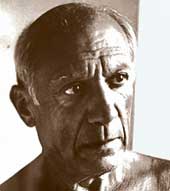 |
| Picasso: Under glare |
Pretoria, March 12 : He was one of the greatest artists of the 20th century and also one of the most controversial. And now, 33 years after his death, the first significant exhibition of Pablo Picasso’s work in South Africa has provoked a furious row after a senior government official accused him of stealing the work of African artists to boost his “flagging talent”.
The Picasso and Africa exhibition, which has been drawing capacity crowds at Johannesburg’s Standard Bank Gallery, contains 84 original works by Picasso along with 29 African sculptures similar to those in the artist’s own collection, and is described as an “innovative dialogue between Picasso’s work and his African inspiration”.
In an extraordinary intervention, however, a spokesman for South Africa’s Department of Arts and Culture has accused the organisers of deliberately downplaying the debt Picasso owed to African artists. In a letter to a local newspaper, Sandile Memela, the department’s head of communications, wrote: “Today the truth is on display that Picasso would not have been the renowned creative genius he was if he did not steal and re-adapt the work of ‘anonymous (African) artists’.”
He continued: “There seems to be some clandestine agenda? that projects Picasso as someone? who loved African art so much that he went out of his way to reveal it to the world? But all this is a whitewash? he is but one of the many products of African inspiration and creativity who lacked the courage to admit its influence on his consciousness and creativity.”
His letter has prompted a furious response. One correspondent compared his attitude to the “black fascists who were critical of Paul Simon when he collaborated with Ladysmith Black Mambazo”. Simon worked with the group on his Gracelands album in 1986 and was accused of exploiting them for commercial ends.
Picasso and Simon are not the only artists to have been accused of appropriating African art without giving full credit. Amedeo Modigliani, the Italian sculptor, was also said to have drawn inspiration from African masks.
Although Memela made it clear he was writing in a personal capacity, opposition politicians said he must have had clearance from the minister, Pallo Jordan. Dianne Kohler Barnard, of the Democratic Alliance, described the comments as “facile, party-line sentiments”, adding: “I do not believe a spokesman for a ministry would say a thing like that without the tacit approval of the minister.”
John Richardson, Picasso’s friend and biographer, said the artist would have been upset by the remarks “because he honoured the sculptures and took them very seriously”. “There were four artists ? Picasso, Braque, Matisse and Derain ? who put tribal art on the map. It was regarded as of no cultural importance but then they started buying it at junk shops and they elevated it to the same importance as Renaissance art,” he said.










